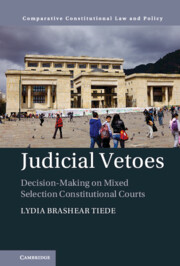Book contents
- Judicial Vetoes
- Comparative Constitutional Law and Policy
- Judicial Vetoes
- Copyright page
- Dedication
- Contents
- Figures
- Tables
- Acknowledgments
- 1 Introduction
- 2 The Implications of Mixed Judicial Selection on Decision-Making
- 3 Mixed Judicial Selection
- 4 The Chilean Constitutional Tribunal in Political Context
- 5 The Colombian Constitutional Court in Political Context
- 6 Determinants of Legal Invalidation by Constitutional Judges
- 7 Determinants of Legal Invalidation by Constitutional Courts
- 8 Weak Judicial Vetoes and Contentious Politics
- 9 Conclusion
- Appendices
- References
- Index
7 - Determinants of Legal Invalidation by Constitutional Courts
Published online by Cambridge University Press: 22 July 2022
- Judicial Vetoes
- Comparative Constitutional Law and Policy
- Judicial Vetoes
- Copyright page
- Dedication
- Contents
- Figures
- Tables
- Acknowledgments
- 1 Introduction
- 2 The Implications of Mixed Judicial Selection on Decision-Making
- 3 Mixed Judicial Selection
- 4 The Chilean Constitutional Tribunal in Political Context
- 5 The Colombian Constitutional Court in Political Context
- 6 Determinants of Legal Invalidation by Constitutional Judges
- 7 Determinants of Legal Invalidation by Constitutional Courts
- 8 Weak Judicial Vetoes and Contentious Politics
- 9 Conclusion
- Appendices
- References
- Index
Summary
This chapter provides explanations and predictions for factors that drive constitutional courts’ decisions in Chile and Colombia. The chapter uses data on the courts’ overall case decisions on the two courts. The chapter shows that changes in the courts’ composition, based on institutional selector, by case and due to fluctuations caused by judges’ schedule, term limits and quorum rules, influence the likelihood of the two courts issuing judicial vetoes,
Keywords
- Type
- Chapter
- Information
- Judicial VetoesDecision-making on Mixed Selection Constitutional Courts, pp. 170 - 207Publisher: Cambridge University PressPrint publication year: 2022

